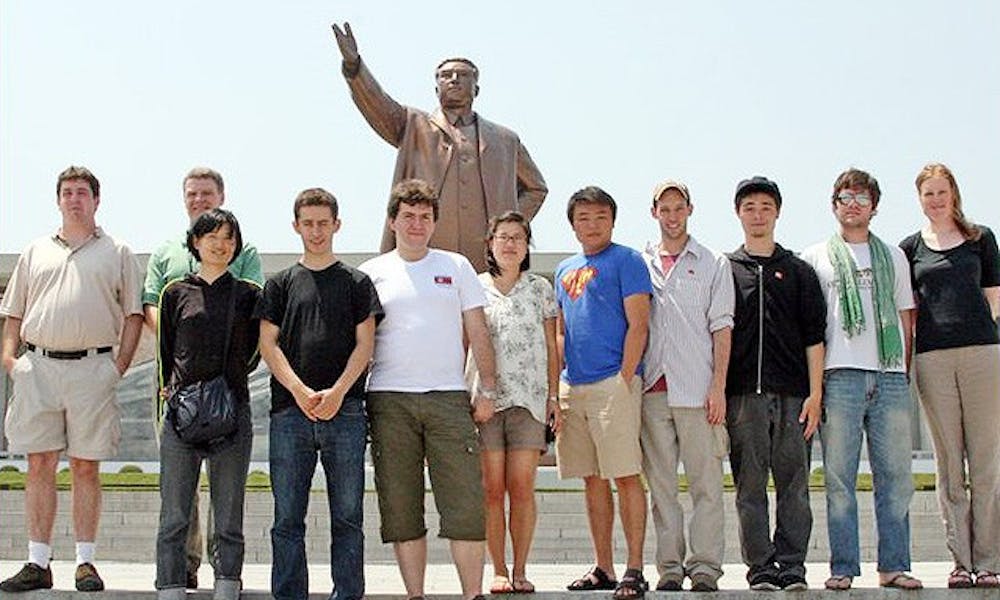Despite North Korea’s strict policies for foreign travelers, some American students now have the opportunity to study in the isolated country.
Senior Jack Zhang visited the country this past June with The P’yongyang Project, a program founded in 2009 to increase academic and cultural interaction between Americans and North Koreans.
The P’yongyang Project, the only educational program that allows Americans to study in North Korea, offers a unique opportunity for students and professors to explore Northeast Asia. The project, which offers summer study abroad programs and shorter delegation trips, hopes to inspire a grassroots movement working toward peace between the nation and other parts of the world through cultural exchange.
“I saw it as a great opportunity to learn about the country first-hand with a group of similarly interested people,” Zhang said. “The idea of going to [North Korea] with people who were going just for the thrills didn’t seem right.”
By roaming the streets of North Korea—under carefully supervised guidance—Zhang learned first-hand about the nation that remains a mystery to most Americans.
The delegation program that Zhang participated in encourages students to act as ambassadors for their home countries through interaction with locals and academic discussion. The delegates, who are identified as “scholars” rather than “tourists,” visited museums and historical sites and immersed themselves in a foreign way of life.
Although Zhang’s interests lie in political science and East Asian studies, students of all academic backgrounds are encouraged to apply for the organization’s variety of programs. THiNK: Transcending History in North Korea, for example, is an intensive two-month Korean language study program open to students of all language levels.
The P’yongyang Project began while Michael Reichel, project director and co-founder, was studying international relations at Brown University. Reichel used his university background and established connections in China to get the project off the ground.
“It got started because we talked,” Reichel said. “It takes patience, and it takes being very respectful and acting in an informed way. It’s about being modest.”
Although Reichel noted that security issues are not as challenging as they may seem, his team does not allow participants to bring recording devices to establish trust between the program and the Koreans. By maintaining positive, human-to-human interaction, students and locals are able to remain open-minded and rid themselves of preconceived notions, Reichel said.
“It is a very dynamic country, and it has a lot of aspects you don’t hear about in the media. It’s far more complex and dynamic of a society than it’s normally made out to be,” he added.
An enthusiastic alum, Zhang invited the program’s founders, Reichel and Nicholas Young, to speak with interested students about the P’yongyang Project at Duke in November. Approximately 50 students attended the event, which was sponsored by the Duke East Asia Nexus.
Although the P’yongyang Project is not currently listed as a non-Duke administered approved program, students interested in the project are able to submit a petition to the office—the procedure followed for any new program. Duke allows travel to North Korea if it is approved by the U.S. government, according to the Duke International Travel Policy.
Peggy Li, a freshman who attended the Nov. 3 presentation, said that although there are concerns associated with traveling to North Korea, she views the project as a great opportunity.
“When [students] think of North Korea, they think ‘bad government,’ but there is a human element as well,” Li said. “I think it is definitely something I want to consider.”
Reichel, who was on a five-week road trip at the time to promote the project at several Canadian and American universities, expects more Duke students to apply to the program in the near future.
“Duke was special,” Reichel said of the project’s visit to the University. “The interest was there, and there were some really insightful questions. It was really exciting.”
Get The Chronicle straight to your inbox
Signup for our weekly newsletter. Cancel at any time.

